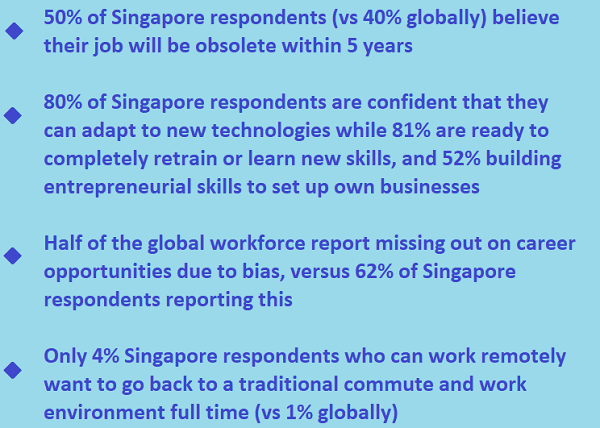SINGAPORE, June 9, 2021 – A new survey of 32,500 workers in 19 countries – one of the largest-ever studies of the global workforce – paints a picture of a global workforce that sees the shift to remote working as just the tip of the iceberg. Reflecting the fact the pandemic has accelerated a number of workforce trends including digitalisation, 65% of respondents in Singapore (vs 60% of global respondents) are worried that automation is putting many jobs at risk; 64% (vs 48% globally) believe ‘stable, long-term employment won’t be around in the future’ and 50% (vs 39% globally) think it is likely that their job will be obsolete within 5 years.
However, in one of the pandemic’s surprising positives, 51% of Singapore workers (vs 40% globally) say their digital skills have been improved through the prolonged period of lockdown, and claim they’ll continue to embrace training and skill development. 81% (vs 77% globally) are ‘ready to learn new skills or completely re-train’ and 79% (vs 74% globally) see training as a matter of personal responsibility. Encouragingly, 80% (vs 80% globally) are confident they can adapt to new technologies entering their workplace. In addition, 52% (vs 49% globally) of respondents are focused on building entrepreneurial skills with an interest in setting up their own business.
Inclusion, open collaboration and transparency crucial for high productivity, innovation and growth
The survey also found that a surprising 62% of workers in Singapore (vs 50% globally) say they’ve faced discrimination at work which led to them missing out on career advancement or training. 29% of Singapore respondents reported being passed over because of their age — with older workers more likely to be affected. 17% (vs 13% globally) reported missing out on opportunities as a result of ethnicity and 15% (vs 14% globally) of workers have experienced discrimination on the grounds of gender, with women 5% (vs twice as likely globally) to report gender discrimination as men.

On top of that, the survey found there are disparities in access to upskilling opportunities. While 39% of people (vs 46% globally) with postgraduate degrees say their employer gives them many opportunities to improve their digital skills, just 22% of people with school-leaver qualifications (vs 27% globally) say the same. 75% of unskilled manual workers say that there are no opportunities for digital upskilling at all.
“If we want to shift to a model of high productivity, innovation and growth, open collaboration, transparency and inclusion are crucial factors that government and business leaders need to collaborate to ensure are translated into the workplace in the form of equal opportunities. People in the most at-risk industries and groups may need additional interventions to ensure that existing gaps are addressed,” said Martijn Schouten, Workforce Transformation Leader, PwC South East Asia Consulting.
Employees want the option to work remotely moving forward
The survey concludes that for many employees, remote working is desired on a sustained basis. Of those who can work remotely, only 4% (vs 9% globally) of those surveyed in Singapore indicated that they wanted to go back to a traditional commute and work environment full time. 83% of Singapore respondents (vs 72% globally) who can work remotely say they prefer a hybrid of in-person and remote working.
Home working need not be limited to professional jobs. 64% of manual workers (vs 43% globally) and 61% of semi-skilled workers (vs 45% globally) say there are many elements of their job that they are able to do remotely.
Younger people more focused on maximising income than ‘making a difference’ if forced to choose
Three-quarters of workers globally and in Singapore (75%) say they want to work for an organisation that will make a ‘positive contribution to society.’ This feeling was especially acute in China (87%), India (90%), and South Africa (90%).
However, economic insecurity is limiting people’s ability to pursue purpose driven careers, with younger people particularly affected. Overall, 62% of those polled in Singapore (vs 54% globally) said, if forced to choose, they would prefer a job that enabled them to ‘take every opportunity to maximise their income’ over a job that ‘makes a difference’ (38% Singapore vs 46% globally).
Interestingly, those between 18 and 34 are more likely than other generations to prioritise income over purpose in their job with 63% in Singapore (vs 57% globally) prioritising ‘maximising their income’ over ‘making a difference’ (37% Singapore vs 43% globally), a margin of 26 points.
“While the world of work is disrupted like never before, there is an opportunity to design a new normal and emerge stronger. As we are all acclimatising to new ways of working, we can consider bold decisions about how and where we work,” said Martijn Schouten, Workforce Transformation Leader, PwC South East Asia Consulting.


